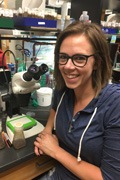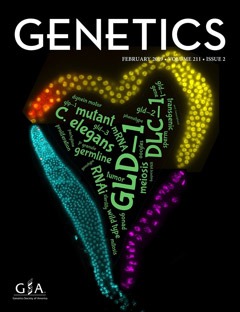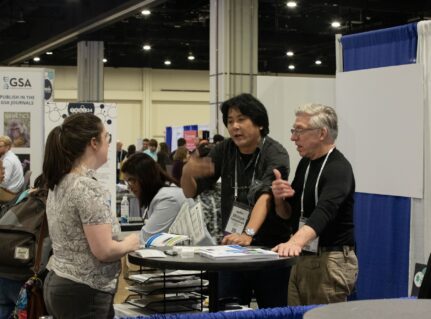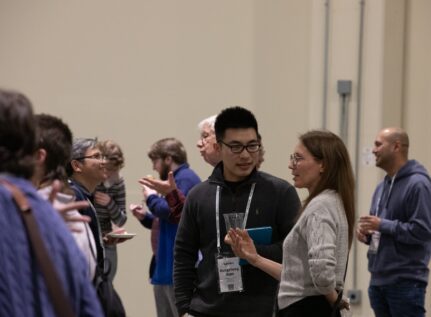
Using the tools of genetics and genomics, nearly 6,000 GSA members from more than 50 countries around the world investigate a wide variety of biological questions and applications.
Learn More

Learn more about why you should publish in the GSA Journals.
Why Publish With Us?Resources for Mid-career Scientists
GSA continuously assesses the needs of our community. The Society recognizes the value of our mid-career members and seeks to help you grow and thrive as a professional. To support your career development, GSA and the Engagement and Professional Development Committee have developed a repository of resources, recommended and curated by fellow Society members. At the end of each academic year, we’ll reach out to our community for resource submissions to ensure resources remain relevant and timely.


Frequently Asked Questions
Career Coaching and Advice
CIMER Training: Receive training to optimize research mentoring relationships from the Center for the Improvement of Mentored Experiences in Research (CIMER). Meant for individuals, institutions, and organizations across the U.S., you’ll understand the mentorship landscape at your organization and work collaboratively to clarify goals and recommended solutions.
GCC Individual Development Plan: Use this worksheet from the Graduate Career Consortium (GCC) as a guide to creating your own Individual Development Plan (IDP)—you’ll participate in exercises that assess your values, interests, progress, and growth; set goals; define an action plan; and find resources, mentorship, and community to develop a fulfilling career.
Global Leadership and Cultural Diversity in Practice: Develop leadership skills and learn how to develop your career within complex international environments with this flexible, context-based program.
Mid-career Minority Faculty Leadership Seminar: Participate in a blended-learning, leadership development program designed by The Association for American Medical Colleges (AAMC) for mid-career faculty aspiring to leadership positions in academic medicine. The hybrid program takes a culturally responsive approach to address the specific needs of participants, through small group mentoring sessions and CV review for career development planning.
NC State SPARK—Summer Programs: Advance your professional development as faculty, staff, and graduate students by participating in this summer program consisting of weekly resource email blasts with the theme “Aspire, Renew, Kindle.” You’ll find this useful to prepare for the Fall semester.
Newly Promoted Associate Professor Workshop: Find resources from Purdue University for navigating a career as a newly promoted associate professor.
Northeast Faculty Leadership Program: Participate in a leadership program from a collaboration between seven universities meant to increase diversity in leadership positions at academic institutions.
Post-tenure articles by Kerry Ann Rockquemore: Read informative posts covering what to do after tenure.
Raising a Resilient Scientist: Watch this five-part virtual series featuring lectures and discussion for faculty, staff scientists, and administrators who mentor students and postdoctoral fellows in biomedical, behavioral, and social sciences. Find resources to support mental health and well-being in research environments.
Sarah Dobson & Co: Get grant consulting and training as a health researcher.
Scholar’s Voice: Learn how to navigate academia from this network of scholars, community-builders, caretakers, partners, moms, and women, offering a 12-week online writing training program and a retreat.
Self-Assessment on Competencies for Grad Professional and Career Development Professionals: Complete this self-assessment from the Graduate Career Consortium to determine what competencies you’d like to develop further including communication, cultural awareness, financials, leadership, outreach, networking, and research.
Step Up to Leadership for Mid-career Growth: Read this Nature article for tips for becoming a leader in your field and transitioning into leadership roles.
Strategies for Coping with the Mid-career Doldrums: Check out this video guide from the American Society for Biochemistry and Molecular Biology for advice on dealing with a mid-career slump.
The Science of Effective Mentoring in STEMM: Find research from the National Academies on the characteristics, competencies, and behaviors of effective mentors and mentees in STEMM, and a resource guide for mentors to create and support sustainable mentoring support systems.
UCLA Mid-career Resources: Find opportunities to give and receive mentorship help, and resources including job application templates and informational videos, curated by the University of California–Los Angeles (UCLA) Alumni Association.
Communication Skills
CIMER Training: Receive training to optimize research mentoring relationships from the Center for the Improvement of Mentored Experiences in Research (CIMER). Meant for individuals, institutions, and organizations across the U.S., you’ll understand the mentorship landscape at your organization and work collaboratively to clarify goals and recommended solutions.
Equine Leadership Program: Gain confidence by working with horses through this alternative to equine therapy, which produces stability, structure, and a scalable system that can be applied to both your personal and professional journeys.
Mid-career Minority Faculty Leadership Seminar: Participate in a blended-learning, leadership development program designed by The Association for American Medical Colleges (AAMC) for mid-career faculty aspiring to leadership positions in academic medicine. The hybrid program takes a culturally responsive approach to address the specific needs of participants, through small group mentoring sessions and CV review for career development planning.
Northeast Faculty Leadership Program: Participate in a leadership program from a collaboration between seven universities meant to increase diversity in leadership positions at academic institutions.
Raising a Resilient Scientist: Watch this five-part virtual series featuring lectures and discussion for faculty, staff scientists, and administrators who mentor students and postdoctoral fellows in biomedical, behavioral, and social sciences. Find resources to support mental health and well-being in research environments.
Sarah Dobson & Co: Get grant consulting and training as a health researcher.
Scholar’s Voice: Learn how to navigate academia from this network of scholars, community-builders, caretakers, partners, moms, and women, offering a 12-week online writing training program and a retreat.
Diversity, Inclusivity, and Cultural Awareness
Global Leadership and Cultural Diversity in Practice: Develop leadership skills and learn how to develop your career within complex international environments with this flexible, context-based program.
Raising a Resilient Scientist: Watch this five-part virtual series featuring lectures and discussion for faculty, staff scientists, and administrators who mentor students and postdoctoral fellows in biomedical, behavioral, and social sciences. Find resources to support mental health and well-being in research environments.
Scholar’s Voice: Learn how to navigate academia from this network of scholars, community-builders, caretakers, partners, moms, and women, offering a 12-week online writing training program and a retreat.
The Science of Effective Mentoring in STEMM: Find research from the National Academies on the characteristics, competencies, and behaviors of effective mentors and mentees in STEMM, and a resource guide for mentors to create and support sustainable mentoring support systems.
Financial Resources and Budgeting
If you have a resource you’d like to contribute to this category, please submit the information, including title, description, and link to engagement@genetics-gsa.org.
Information Management
If you have a resource you’d like to contribute to this category, please submit the information, including title, description, and link to engagement@genetics-gsa.org.
Knowledge of Population and Disciplines
If you have a resource you’d like to contribute to this category, please submit the information, including title, description, and link to engagement@genetics-gsa.org.
Leadership, Management, and Administration
Equine Leadership Program: Gain confidence by working with horses through this alternative to equine therapy, which produces stability, structure, and a scalable system that can be applied to both your personal and professional journeys.
Executive Education Leadership for Executives: Participate in this in-person leadership development program to gain skills to address 21st century challenges and cultivate the ability to adapt to any role.
Global Leadership and Cultural Diversity in Practice: Develop leadership skills and learn how to develop your career within complex international environments with this flexible, context-based program.
Help, I’m a Scientist!: Use this collection of resources including blogs, Slack channels, and papers, for PIs to learn how to run a lab effectively.
Mid-career Minority Faculty Leadership Seminar: Participate in a blended-learning, leadership development program designed by The Association for American Medical Colleges (AAMC) for mid-career faculty aspiring to leadership positions in academic medicine. The hybrid program takes a culturally responsive approach to address the specific needs of participants, through small group mentoring sessions and CV review for career development planning.
Mid-career Scientists—Advice to our Younger Selves: Find helpful advice from five researchers who describe what it’s like to be a mid-career scientist and field questions from junior colleagues, describing what they wish they’d known at their age.
Northeast Faculty Leadership Program: Participate in a leadership program from a collaboration between seven universities meant to increase diversity in leadership positions at academic institutions.
Raising a Resilient Scientist: Watch this five-part virtual series featuring lectures and discussion for faculty, staff scientists, and administrators who mentor students and postdoctoral fellows in biomedical, behavioral, and social sciences. Find resources to support mental health and well-being in research environments.
The Science of Effective Mentoring in STEMM: Find research from the National Academies on the characteristics, competencies, and behaviors of effective mentors and mentees in STEMM, and a resource guide for mentors to create and support sustainable mentoring support systems.
Marketing, Outreach, and Technology
If you have a resource you’d like to contribute to this category, please submit the information, including title, description, and link to engagement@genetics-gsa.org.
Mentoring, Training, Teaching, and Education
CIMER Training: Receive training to optimize research mentoring relationships from the Center for the Improvement of Mentored Experiences in Research (CIMER). Meant for individuals, institutions, and organizations across the U.S., you’ll understand the mentorship landscape at your organization and work collaboratively to clarify goals and recommended solutions.
GCC Individual Development Plan: Use this worksheet from the Graduate Career Consortium (GCC) as a guide to creating your own Individual Development Plan (IDP)—you’ll participate in exercises that assess your values, interests, progress, and growth; set goals; define an action plan; and find resources, mentorship, and community to develop a fulfilling career.
National Center for Faculty Development and Diversity: Find resources for faculty development with a focus on diversity, success, and work-life balance.
Newly Promoted Associate Professor Workshop: Find resources from Purdue University for navigating a career as a newly promoted associate professor.
Raising a Resilient Scientist: Watch this five-part virtual series featuring lectures and discussion for faculty, staff scientists, and administrators who mentor students and postdoctoral fellows in biomedical, behavioral, and social sciences. Find resources to support mental health and well-being in research environments.
Scholar’s Voice: Learn how to navigate academia from this network of scholars, community-builders, caretakers, partners, moms, and women, offering a 12-week online writing training program and a retreat.
The Science of Effective Mentoring in STEMM: Find research from the National Academies on the characteristics, competencies, and behaviors of effective mentors and mentees in STEMM, and a resource guide for mentors to create and support sustainable mentoring support systems.
Program and Event Administration
If you have a resource you’d like to contribute to this category, please submit the information, including title, description, and link to engagement@genetics-gsa.org.
Relationship Building and Networking Skills
AAAS 2014 Career Development Workshops: Explore these career development resources from the American Association for the Advancement of Science (AAAS), covering topics like communication skills, career pathways, personal development, and more.
Executive Education Leadership for Executives: Participate in this in-person leadership development program to gain skills to address 21st century challenges and cultivate the ability to adapt to any role.
Global Leadership and Cultural Diversity in Practice: Develop leadership skills and learn how to develop your career within complex international environments with this flexible, context-based program.
Mid-career Minority Faculty Leadership Seminar: Participate in a blended-learning, leadership development program designed by The Association for American Medical Colleges (AAMC) for mid-career faculty aspiring to leadership positions in academic medicine. The hybrid program takes a culturally responsive approach to address the specific needs of participants, through small group mentoring sessions and CV review for career development planning.
Mid-career Scientists—Advice to our Younger Selves: Find helpful advice from five researchers who describe what it’s like to be a mid-career scientist and field questions from junior colleagues, describing what they wish they’d known at their age.
Northeast Faculty Leadership Program: Participate in a leadership program from a collaboration between seven universities meant to increase diversity in leadership positions at academic institutions.
The Science of Effective Mentoring in STEMM: Find research from the National Academies on the characteristics, competencies, and behaviors of effective mentors and mentees in STEMM, and a resource guide for mentors to create and support sustainable mentoring support systems.
Research, Assessment, and Evaluation
AAAS 2014 Career Development Workshops: Explore these career development resources from the American Association for the Advancement of Science (AAAS), covering topics like communication skills, career pathways, personal development, and more.
Forensic Science Regulator Guidance: Use this technical guide for forensic science regulators.
NC State SPARK—Summer Programs: Advance your professional development as faculty, staff, and graduate students by participating in this summer program consisting of weekly resource email blasts with the theme “Aspire, Renew, Kindle.” You’ll find this useful to prepare for the Fall semester.
Post-tenure articles by Kerry Ann Rockquemore: Read informative posts covering what to do after tenure.
